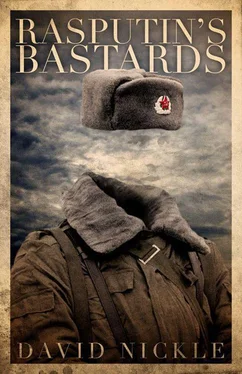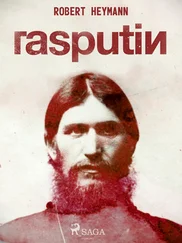In the morning, they would have another conversation face to face. Shadak hoped that she’d gotten fat — or stringy — or developed a skin condition. Anything to give him the edge in their interview.
“Pah,” he said aloud, forcing himself to sit up in his bed, “you are a shallow creature, Amar. Moved by lust and sentiment before sense.”
Shadak stood again — threw back his shoulders and tightened his smile — and strode across the room, through a curtain and into the hallway. To his left, tall leaded-glass windows cut into the stonework admitted silvered moonlight, painting themselves across the stonework of the narrow corridor. A man with an Uzi dangling from a strap on his shoulder nodded deferentially as Shadak strode past. Shadak barely acknowledged him.
Lust and sentiment . Jean Kontos-Wu had played to those two vulnerabilities well in the early years: an agonizingly beautiful girl, trapped by a wicked husband. He might have killed him for her — he would have, if congestive heart failure hadn’t taken the old man first.
He stepped around a corner and out onto a low balcony, facing west. He regarded the darkened, jagged horizon. Far beyond it, over the ocean, the two of them — Jean Kontos-Wu and Stephen — flew toward him. They would talk in the morning. Settle things. Find answers together, in a pit beneath the caravansary’s mosque. Shadak regarded the night a moment longer, then turned back to his bedchamber.
In the morning, Jean Kontos-Wu would open up to him. Amar Shadak would, he vowed, be the one in control — not her. Not this time.
Up until they got on the plane, Mrs. Kontos-Wu was in control. No question about it — she was so much in control that Stephen had all but forgotten Kolyokov’s message to him: Allow Mrs. Kontos-Wu to assist, but take the lead yourself .
He should have remembered that — never mind that Mrs. Kontos-Wu had managed to take charge of the mobsters like a kindergarten teacher with a busload of preschoolers. The fact was, in the process of ordering them around, she effectively surrendered to them. She’d done it with such confidence that Stephen was sure she had something up her sleeve — but by the time they got to the little airfield up in Connecticut, clambered out of the back of the laundry truck and stomped across the tarmac to the waiting Lear jet, Stephen was starting to suspect that maybe this was not so.
The jet was not Shadak’s; it appeared to belong to a woman named Ming Lei, if the monogrammed toiletries in the washroom were any indication. The same Ming Lei as the boat that Shadak’s people lost? He would have asked her, but Ming Lei was not on board — just a thickset pilot who sounded like he was from Louisiana and a bald-headed gentleman in a dark suit who introduced himself as Mr. Beg.
“We are all old friends,” he said when Stephen started to ask a question about Shadak. “Old comrades . That’s all.”
He collected their passports, then in a barely perceptible accent explained what would happen at the first sign of trouble.
“The Atlantic is very deep,” said Mr. Beg. “You can be above it, or below it.”
Mrs. Kontos-Wu smiled sweetly and thanked him for the information, and Stephen banished his suspicions about Mrs. Kontos-Wu’s competence. She had to have a plan. She was too cool — her expression too utterly unrevealing of any doubts in this enterprise. Not like Stephen — who felt like he was betraying every anxiety — every terror — with each blink of an eyelid or intake of breath.
She’d seemed cool. But hours later, once the plane landed, and they descended the three steps to the rougher tarmac outside this castle of Shadak’s, he revised his opinion.
“This doesn’t look like Bishop’s Hall,” she said as she looked at the square stone towers crawling up the mountainside. Then she looked at Stephen. “Do you suppose the library’s still intact?”
“This isn’t Bishop’s Hall,” said Stephen nervously.
Mr. Beg merely chuckled.
“It is a mad time, yes?” he said, and laughed. “Like Afghanistan.”
Stephen looked at him with another question. Beg held up a finger and ducked back into the plane.
Mrs. Kontos-Wu regressed quickly. As they climbed a great curving set of stairs to a wide grated gateway, she was chattering on about a book she’d apparently been reading — about some girl called Becky, and how she’d finally wound up in London after being chased by men with funny hats from one end of the Orient Express to the other. “London’s safe,” said Mrs. Kontos-Wu as they were led by four machinegun-toting Romanians along the base of the wall to a tower. “No foreigners.”
“Really? When was the last time you were in London?” said Stephen, grasping at a final, desperate hope that Mrs. Kontos-Wu was just having him on.
“Mummy’s taking me this summer,” said Mrs. Kontos-Wu and the last of Stephen’s hope slipped away.
He swore under his breath. Should have killed the fucking wops when I had the chance .
Killing the three mobsters wouldn’t have been easy without Miles’ help, but Stephen thought he could have done it. And he would have had the Emissary’s housekeeping services, with their gloves and bone saws and acid bottles, to help him clean up the mess.
But no — Stephen had somehow managed to misread Mrs. Kontos-Wu’s mental capacities. Just as he’d misread everything else that had happened since Fyodor Kolyokov had departed. And that included Kolyokov’s parting words: Take the lead yourself .
It was a bit late for any lead-taking now. The four Romanians were big, and their guns were out. There was a moment of confusion, when they seemed to be discussing where to take their prisoners. Two of them seemed to think they should go straight to the main manor building in the middle — the other two pointed insistently at a tower.
It was confusion, yes — but not enough confusion to override the inherent advantage of the four big Romanians with guns. When they finally took them to the tower, and into a little triangular room half-way up, Stephen’s options for lead-taking diminished to nothing.
Almost nothing.
No sooner had they settled down into the dark of the tower room than a voice, cracked from thirst and injury, came from the shadow beneath the chamber’s single narrow window.
“You — you are here from the Children… yes?”
Stephen pushed himself up on his haunches.
“Who are you?”
The voice snorted. “Uzimeri,” it said.
The name meant nothing to Stephen. “You — you okay there?”
“Do I sound ‘okay’?”
Stephen squinted through the dark. He could make out what looked like a pile of rags, propped up here and there by what looked like broken broom handles and straw. It could have been that — or it could be an injured old man called Uzimeri.
“What do you mean about, ‘the Children’?”
“Hah.” The pile of rags might have shifted as a rat scuttled out from underneath — or this Uzimeri character might have waved a hand dismissively. “You have to ask, you don’t know. I made a mistake.”
“What’d you do to piss Amar Shadak off?”
The rag pile chuckled. “I know your game,” it said. “You two are coming in here to make me give a jailhouse confession — aren’t you? Shadak thinks I’ll tell you about what happened to the submarine, things I wouldn’t tell him at the end of his belt.”
Stephen’s ears pricked at that.
His submarine?
The same submarine, perhaps, that allegedly sank Ming Lei 3 ?
Stephen got up and walked across the straw-covered floor. He settled down again next to this rag pile of a man. The smell was awful nearby — of piss and shit and something worse.
Читать дальше












